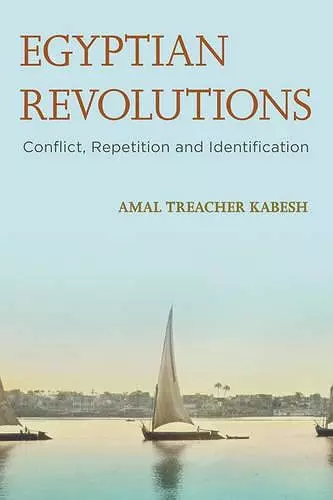Egyptian Revolutions
Conflict, Repetition and Identification
Format:Hardback
Publisher:Bloomsbury Publishing PLC
Published:16th Mar '17
Currently unavailable, and unfortunately no date known when it will be back

The socio-political context of Egypt is full of the affectual burdens of history. The revolutions of both 1952 and 2011 proclaimed that the oppressive, colonial past had been overthrown decisively. So why has the oppression perpetrated by previous regimes been repeated? What impact has this had on the lives of ‘ordinary’ citizens?
Egyptian Revolutions looks at the impact of the current events in Egypt on citizens in relation to matters of belonging, identification and repetition. It contests the tendency within postcolonial theory to understand these events as resistance to Western imperialism and the positioning of activists as agents of sustainable change. Instead, it pays close attention to the continuities from the past and the contradictions at work in relation to identification, repetition and conflict. Combining postcolonial theory with a psychosocial studies framework it explores the complexities of inhabiting a society in a state of conflict and offers a careful analysis of current theories of gender, religion and secularism, agency, resistance and compliance, in a society riven with divisions and conflicts.
This powerful book offers a distinctively new perspective on recent socio-political events in Egypt. Egyptian Revolutions draws together postcolonial and feminist theory to provide a unique and important account of the psychic life of politics. It weaves an evocative account of everyday life into a compelling theory of political subjectivities, showing how the seemingly private and personal is also historical and the social. It will be crucial reading for anyone interested in contemporary gender and postcolonial studies, as well as those hoping for a better understanding of the hopes, fears, angers, and loves animating Egyptian political life. -- Kirsten Campbell, Department of Sociology, Goldsmiths, University of London
This is a powerful book. Weaving skilfully political history and recent events, characters in novels and in ordinary life, the author makes a poignant plea for understanding Egypt’s failed revolutions in terms of emotions and subjectivities. In the social context of Arab societies, this book is also radically critical and courageous. While acknowledging structural constraints and Western interference, Kabesh puts individual judgment and responsibility at the centre of Egypt’s recurring failures. But this breathtaking cri de coeur has resonance beyond Egypt. Across the Arab region, enduring authoritarianism, entrenched religious extremism, and deep social conformism are raising vexing questions about the Arabs’ repeated failures to achieve sovereignty. -- Abdeslam Maghraoui, Associate Professor of the Practice of Political Science, Duke University, USA
This is a book that delves into the psyche and soul of the Egyptian revolutionary impulse through the years leading to the Arab Spring of 2011. This sensitive and powerful analysis does not leave one stone unturned in its effort to understand how narratives, memories and the harsh reality of life lead to resistance and its failure. The feebleness of the human being in front of coercive and oppressive regimes is both a source of lament for the author as much as it is a challenge that would have to be faced more successfully in the future. -- Ilan Pappé, Professor of History, Institute of Arab and Islamic Studies, University of Exeter
There is no dearth of books on Egyptian revolution of 2011. Amal Treacher Kabesh’s present book adds a new dimension. Drawing upon the postcolonial theory and socio-psychological perspectives, her book privileges a subjective understanding of the events and their consequences on the existential as well as the quotidian life of the Egyptians. -- Habibul Haque Khondker, Professor, Zayed University, UAE
By joining together a psychoanalytic framework and postcolonial theory and personal proximity, Amal Treacher Kabesh explores the complexity of conflictual processes of negotiating and recreating valuable identities in today’s Egypt, an extremely interesting case-study of more structural regional processes. She thereby offers extremely valuable insights into the social foundation, legitimising mechanisms, and challenges to social and political authoritarian structures in the contemporary Middle East. -- Alessandra Quarenghi, Professor, Università Cattolica del Sacro Cuore
ISBN: 9781783481873
Dimensions: 226mm x 146mm x 18mm
Weight: 367g
196 pages